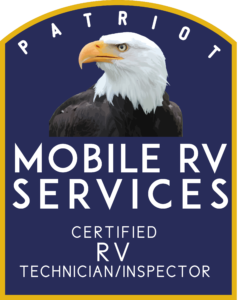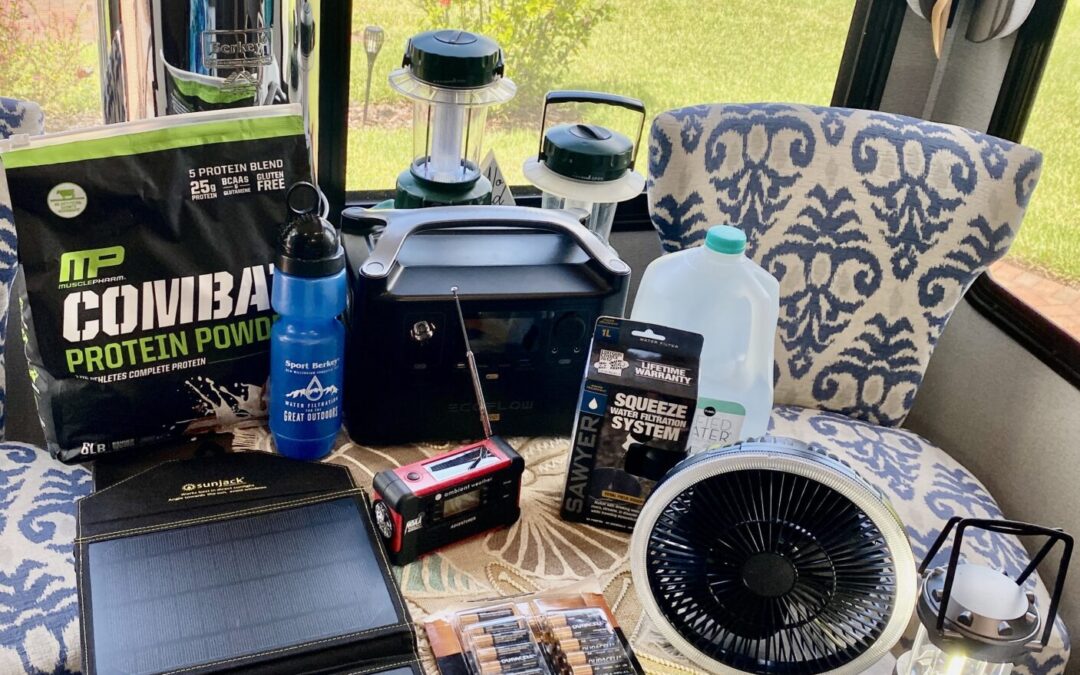Emergency Preparedness: Not an exciting topic, but a necessary one!
September is National Emergency Preparedness month. Here in Florida, we’re also at the peek of hurricane season this week. Living in an RV is a wonderful lifestyle, but in the event of any serious storm system or extremely high winds, it’s one of the last places you may choose or want to be. As a disclaimer, always follow local weather announcements and evacuate when recommended. This may seem obvious, but know where you’re going to evacuate to!
I thought I’d share some ideas with you of things we’ve personally implemented over the years. I’m not suggesting that you do these things or that they are even right for you. We all have unique needs, skillsets and resources. I hope that you find them helpful, nonetheless.
Specifically for our RV, we do the following:
![]() Fill fresh water tank. This is helpful for obvious reasons, but can also provide additional weight for your RV.
Fill fresh water tank. This is helpful for obvious reasons, but can also provide additional weight for your RV.
![]() If possible, put slides in.
If possible, put slides in.
💨 Tie down and store away any items you have outside on your RV site.
![]() Keep the LP tanks full, but when weather is severe, we recommend closing the propane tanks to the “off” position.
Keep the LP tanks full, but when weather is severe, we recommend closing the propane tanks to the “off” position.
![]() Do you have a generator on your RV? I recommend running it once-per-month for about one hour to keep it in optimal working order.
Do you have a generator on your RV? I recommend running it once-per-month for about one hour to keep it in optimal working order.
In addition to items mentioned in the official Florida checklist , here are some things we keep on-hand in our RV for daily use or emergencies:
(Pictured)
– [ ] NOAA Crank Radio
– [ ] Solar Cordless Fan
– [ ] Batteries
– [ ] Lanterns (we prefer LED ones)
– [ ] Small Solar Generator
– [ ] Powerbanks
– [ ] Water filtration options (Berkey, Sawyer, bottled, purification tablets, etc)
– [ ] We eat strictly keto, so keep extra protein powder on-hand
– [ ] First Aid kit (we have those things stashed everywhere!)
These are just a few ideas. Space in an RV is at a premium, but we have a dedicated cabinet where many of these things are conveniently stored.
Here is the checklist that our county shared recently that you may also find helpful/useful: Emergency Checklist
From our friends at LazyDays:
- Plan an evacuation route.
- Select an elevated campsite away from large trees.
- Make a video or take photographs of everything inside your RV.
- Purchase waterproof document holders for important papers.
- Check your RV insurance to make sure you’re covered for hurricanes.
- Identify where you’ll store your towable RV or Motorhome should you need to evacuate. Also, make sure it’s not in a low-lying area that’s prone to flooding.
WHEN THE STORM IS APPROACHING
- Prepare an emergency kit with potable water, non-perishable foods and other personal items you may need, like prescription medications.
- Fill containers with water for hygiene needs like brushing your teeth and flushing the toilet. If you have a bathtub, fill it as well.
- Purchase batteries, garbage bags, tarps (which come in handy for patching the roof), a battery-operated radio, an oil lamp and oil, and even a small window air conditioner, which can run off your generator and allow you to sleep better.
- Fill the fuel tank and check your fluids. Inspect the tires and windshield wipers. If you have a grill, make sure you have enough propane.
- Place valuable papers in waterproof containers or plastic zipped bags.
- Consider boarding up the widows with Plylox®, which allows you to easily attach plywood and can be purchased at a local home store.
- Make sure your fire alarms and carbon monoxide detectors have fresh batteries installed.
- Perform a safety check of the entire vehicle. Make sure you know where the transfer switch is for the generator, so you can isolate the electricity from the rest of the power grid to prevent electrical shocks.
IF YOU’RE ADVISED TO EVACUATE
- Avoid driving through water. It may stall your engine and cause irreparable engine damage. Moving water can sweep away your vehicle, and roads covered by standing water are prone to collapse.
- Remove any nearby tree branches or other items that may become airborne.
- Empty your motorhome’s holding tanks, turn off propane cylinders and cover the regulator.
- Cover your vents and the air conditioning unit and tie down travel trailers.
- Secure all items located outside your RV, including lawn chairs, tables, grills, etc. Even a dustpan can be a lethal weapon in 100-mile-an hour winds.
Most importantly, it’s not worth staying to ride out a hurricane or tropical storm. If you’re advised to evacuate, do so quickly. Hurricanes can be frightening, but following these easy steps will ensure you’re prepared to protect yourself and your RV.

